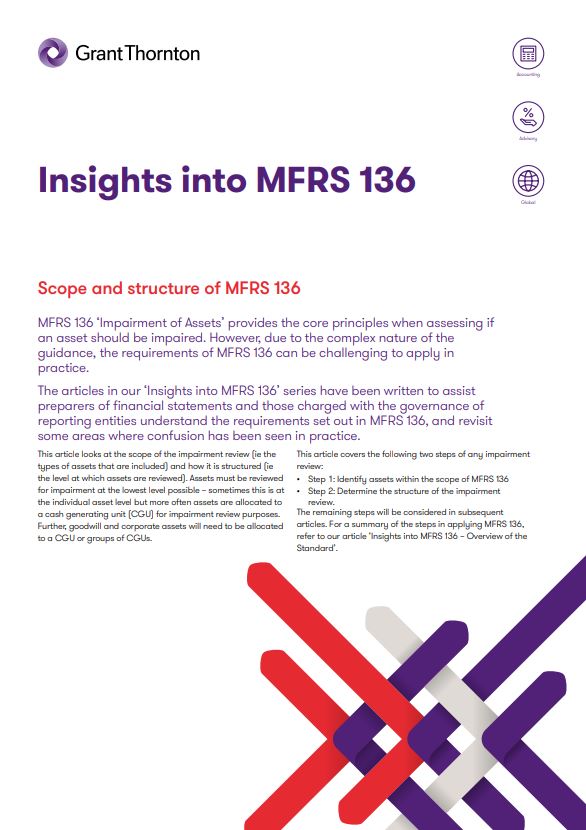-
Audit approach
Designing a tailored audit programme customised for your business, we will combine the collective skill and experience of assurance professionals around the world to deliver an audit that is efficient and provides assurance to your key stakeholders.
-
Audit methodology
At Grant Thornton we use a single audit methodology (LEAP) across our global network. This means that our clients get a consistent, high-quality approach wherever they are.
-
MFRS
At Grant Thornton, our MFRS advisers can help you navigate the complexity of financial reporting.
-
Reporting Accountants
Reporting Accountants
-
Our local experts
Our local experts
-
Tax advisory & compliance
Our teams can prepare corporate tax files and ruling requests, support you with deferrals, accounting procedures and legitimate tax benefits.
-
Corporate & individual tax
Our teams can prepare corporate tax files and ruling requests, support you with deferrals, accounting procedures and legitimate tax benefits.
-
International tax & Global mobility services
Our teams have in-depth knowledge of the relationship between domestic and international tax laws.
-
Indirect tax
Our indirect tax specialists help clients in effective planning; assist to bring clarity to the legislation; assist and advise in audits or investigations. It is important for all entities, whether or not required to register for Sales Tax or Service Tax to analyse the impact of the taxes on their business operations, their revenues and expenses, and their customers and suppliers.
-
Tax audit & investigation
Tax audit and investigation
-
Transfer pricing
Transfer pricing
-
Corporate finance
Whether you are raising capital, disposing of a business or seeking a wider market for your company's shares on a stock market, we are ready to help make it a successful and stress-free experience for you.
-
Business consulting
Our business consulting services help organisations improve operational performance and productivity throughout the growth life cycle.
-
Recovery and reorganisation
We provide a wide range of services to recovery and reorganisation professionals, companies and their stakeholders.
-
Business risk services
We can help you identify, understand and manage potential risks to safeguard your business and comply with regulatory requirements.
-
Forensic and investigation
We take a 360-degree view of your situation using our deep experience, industry specialization and global reach to help you get to the core of the issue with a full service portfolio of capabilities.
-
Our values
We have six CLEARR values that underpin our culture and are embedded in everything we do.
-
Learning & development
At Grant Thornton we believe learning and development opportunities help to unlock your potential for growth, allowing you to be at your best every day. And when you are at your best, we are the best at serving our clients
-
In the community
Many Grant Thornton member firms provide a range of inspirational and generous services to the communities they serve.
-
Internship
Internship

MFRS 136 ‘Impairment of Assets’ provides the core principles when assessing if an asset should be impaired. However, due to the complex nature of the guidance, the requirements of MFRS 136 can be challenging to apply in practice.
The articles in our ‘Insights into MFRS 136’ series have been written to assist preparers of financial statements and those charged with the governance of reporting entities understand the requirements set out in MFRS 136, and revisit some areas where confusion has been seen in practice.
This publication covers the following two steps of any impairment review:
• Step 1: Identify assets within the scope of MFRS 136
• Step 2: Determine the structure of the impairment review.
The remaining steps will be considered in subsequent articles.
How we can help
We hope you find the information in this article helpful in giving you some insight into MFRS 136. If you would like to discuss any of the points raised, please do not hesitate to contact us.


